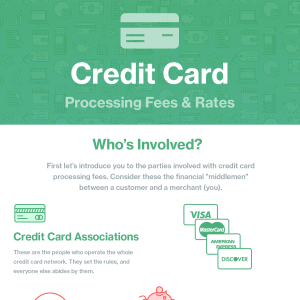This guide walks you through credit card surcharges, including how they work, the laws behind them, and whether they make sense for your business.
Our content reflects the editorial opinions of our experts. While our site makes money through
referral partnerships, we only partner with companies that meet our standards for quality, as outlined in our independent
rating and scoring system.
For years, merchants accepted processing fees as just the cost of doing business. But now, more are turning to surcharging to pass some of those costs back to customers who pay with a credit card.
In this guide, we’ll cover what credit card surcharges are, how they work, the legal rules you’ll need to follow, and whether they make sense for your business.
What Is A Credit Card Surcharge?
A credit card surcharge is an extra fee added to a customer’s bill when they pay with a credit card.
Instead of the merchant absorbing the cost of processing, the fee shifts that expense to the customer who chooses to use a credit card. Other payment methods, like cash or debit cards, don’t have this fee.
Credit Card Surcharging VS Cash Discounting
Surcharging is sometimes called “zero-fee” or even “free” credit card processing. Cash discounting, on the other hand, works by giving customers a discount when they pay with cash, check, or debit — essentially avoiding the card processing cost.
Both methods shift the cost of card acceptance back to the customer, but in different ways:
| Method |
How It Works |
Legality |
| Surcharging |
Adds a fee on top of the price when a customer uses a credit card |
Legal in most states, banned in a few. |
| Cash Discounting |
Gives a discount when customers pay by cash, check, or debit |
Legal everywhere in the US. |
For merchants, the key takeaway is this: cash discounting is always legal nationwide, while surcharging has state-level restrictions.
How Do Credit Card Surcharges Work?
If you’ve set up a legal surcharging policy, the process is simple:
- A customer pays with a credit card.
- The surcharge is automatically added as a separate line item on the receipt.
- The amount collected offsets your credit card processing fee.
Legally, the surcharge cannot exceed your actual processing cost and is capped at 4% nationwide (2% in Colorado).
Is It Legal To Add A Credit Card Surcharge?
For years, surcharging wasn’t allowed. But thanks to lawsuits and legislative changes, it’s now legal in most states — as long as you follow both state laws and the card networks’ rules.
Credit Card Surcharge Laws
While surcharging is legal in 47 states, merchants must follow both state laws and the rules set by Visa, Mastercard, Amex, and Discover.
Before looking at card network requirements, it’s important to confirm your state’s laws. Most state bans have been overturned, but three states and one U.S. territory still prohibit surcharges.
States That Don’t Allow Credit Card Surcharges
At the time of this update, credit card surcharges are not allowed in:
- Connecticut
- Maine
- Massachusetts
- Puerto Rico
If your business operates in one of these areas, adding a surcharge is illegal. However, you can still offer cash discounts, which are legal everywhere.
Legal Requirements For Credit Card Surcharging
If your state allows surcharging, you still need to meet these requirements:
- Only credit cards can be surcharged (never debit or prepaid).
- The surcharge must be clearly disclosed to customers.
- It must appear as its own line item on receipts and invoices.
- The surcharge cannot exceed your actual processing cost and cannot be for profit
- Surcharges are capped at 4% nationwide (2% in Colorado).
These rules apply to consumer businesses. There are some special cases:
- Government & education: In many states, these institutions can add surcharges even when consumer businesses cannot.
- Multi-state businesses: You can surcharge in states that allow it and skip it in states that ban it. Just make sure your compliance setup is tailored to each location.
Should You Add A Credit Card Surcharge Policy?
Thanks to legal changes, surcharging has become much more common. Many businesses see it as a way to cut operating costs without raising prices across the board.
But just because you can surcharge doesn’t mean you should. Here are the trade-offs:
Pros
- Lets you recover some or all of your card processing costs
- May encourage customers to pay with cheaper methods (cash, ACH, debit)
- Many consumers are now familiar with surcharges and won’t be surprised
Cons
- Risk of losing price-sensitive customers to competitors
- Can reduce loyalty if shoppers feel “nickel-and-dimed”
- Adds complexity to your payment setup (extra line items, disclosures, compliance checks)
- Rules may change over time, requiring ongoing monitoring
How To Save Money On Credit Card Processing Fees Without Surcharging
Not sure if surcharging is right for you? There are other ways to cut processing costs:
- Explore free payment processing programs (often bundled with cash discounting).
- Shop around for a processor that offers better rates.
- Tighten up your cash flow and lower overall expenses to ease pressure from fees.
- Offer cash discounts instead of adding surcharges.
You can even combine these strategies to maximize savings.
How To Legally Create A Credit Card Surcharge Policy
If you decide to move forward with surcharging, you’ll need to do more than just flip a switch. Compliance takes planning:
Confirm Your Processor Supports Surcharging
Not all processors or POS systems are set up for this. Make sure your payment gateway or equipment can add surcharges as a separate line item on invoices and receipts.
Notify Your Processor & Card Networks
You’re required to give written notice to your merchant acquirer and the card networks (Visa, Mastercard, Amex, Discover) before adding surcharges. A quick call to your account rep can get you started, but they’ll likely need formal paperwork.
Only Apply Surcharges To Credit Cards
Never surcharge debit or prepaid cards, even if a customer runs a debit card “as credit.” Federal law (the Durbin Amendment) specifically protects debit transactions.
Give Customers Proper Notice
You must:
- Post signs at your store entrance and point of sale
- State the surcharge percentage (and confirm it doesn’t exceed your fees)
- For invoices, include the surcharge in the notes or itemization
- In Maine and New York, you must display both the cash and credit card price in dollars and cents
For eCommerce, disclosures must appear during the online checkout process and on receipts.
Document Surcharges
Card networks require that the surcharge appear as a separate line item on every receipt (both in-person and online).
Report Surcharges Back To Your Processor
Your processor and the card networks will expect surcharge reporting, so confirm your setup can handle it.
Use Tools That Simplify Surcharging
If this sounds like a lot of work, don’t worry — some processors make it easier. Square and other top processors offer built-in tools to automate surcharge compliance and reporting
The Bottom Line On Credit Card Surcharges
Credit card surcharges can help cover processing costs, but they’re not right for every business. They come with strict rules, customer sensitivity, and compliance hurdles.
Before you add them, weigh the pros and cons, compare alternatives like cash discounts, and make sure you’re following both card network rules and state laws.












